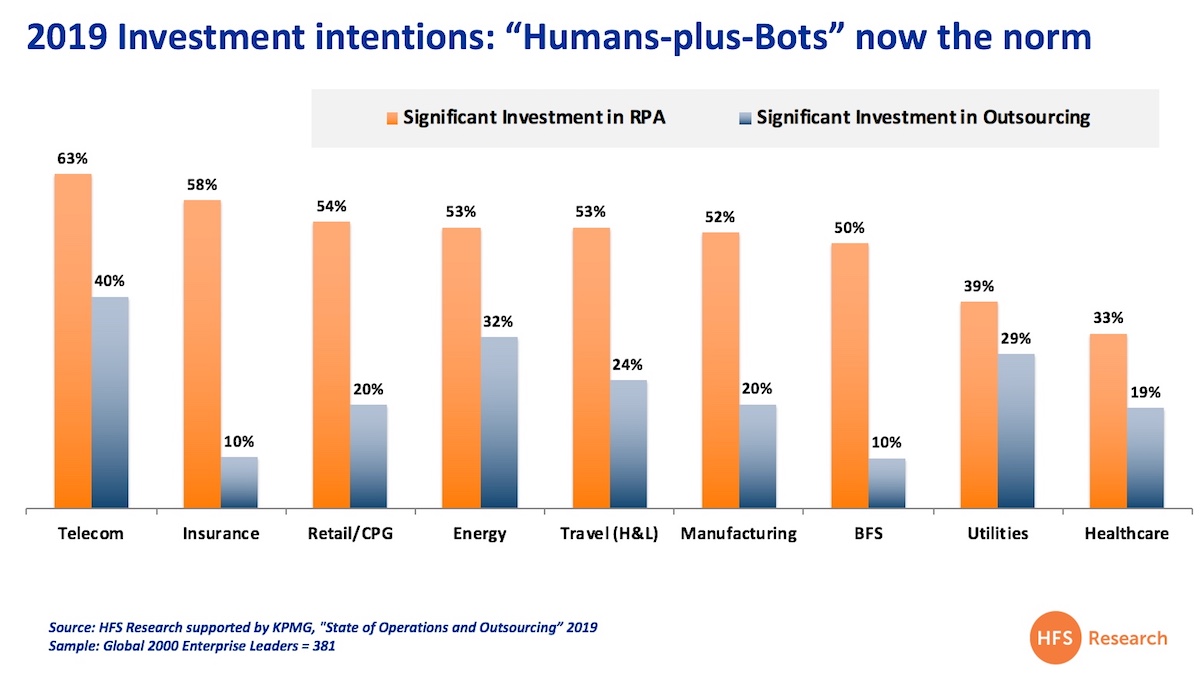
BPO (Business Process Outsourcing) grew up because of all the exceptions enterprises have to process that were not able to be absorbed into the standard ERP software. Yes, we found people equipped to do this work at lower wages housed by efficiently run service providers. And that work we couldn’t initially send to the BPO providers we just found manual workarounds to get it done until we eventually found an outsourcer who would find a model to take on that work for you.
However, just as many enterprises were running out of places to find (yet) more and more hidden costs they could quickly remedy through (yet) more outsourcing, along came their perfect new toy to unearth costs they had never thought possible to eliminate: RPA.
Yes, folks, this stuff is just the thing to keep you occupied for the next few years to keep your greedy CFOs at bay – and even includes the word “robot” to conjure up images of human work displacement, creating hours upon hours of repetitive (robotic) debate at conferences from people who literally sprung from seemingly nowhere to become lifelong experts in this new dark art.
And, oddly, most of these new RPA maestros seem to be exactly the same people who were hawking the delights of business process outsourcing just a couple of years ago. So maybe the connection between BPO and RPA is a lot closer than we think?
Let’s examine the findings from the recent State of Operations and Outsourcing study, conducted with the support of KPMG across 381 Global 2000 organizations, where we questioned operations leaders about their intentions to keep investing in both RPA and outsourcing. This data shows the tranche of operations leaders making significant investments in RPA and outsourcing, sliced by industry sector:
Financial services firms, where outsourcing is most mature, are showing voracious appetites to go down the RPA path
While banks and insurers are showing the smallest appetite (10%) to keep pursuing aggressive outsourcing strategies, they are right at the front of the queue (50%) when it comes to RPA. Insurers were one of the first industries to explore BPO and offshoring twenty years ago, so it’s little surprise that RPA is so appealing to these firms, where they can find completely new ways to mimic highly repetitive, intensive processes, plagued by manual workarounds, using smart software solutions. In addition, many of these firms have been outsourcing back-end processes that have become very stale over the years, and RPA provides the perfect shakeup to rethink how to rework these.
Sometimes RPA provides the perfect catalyst to force an outsourcer to get back to the table to reinvest in their client or risk losing them to a hungrier competitor. Banks have always been a bit weird when it comes to outsourcing – they have tended to move massive amounts of IT development and maintenance work to service providers over the years, in addition to infrastructure, but have been very shy when it comes to BPO, often preferring to move process work into their offshore shared service centers, citing issues around privacy and compliance as their reason to keep it inhouse. It’s surprising that the appetite to explore RPA is so strong (58% making significant investments this year) when you consider that most banks have to comply with various regulations which necessitate a human to oversee pretty much every process that is conducted within their organization.
However, with the sheer quantity of legacy detritus plaguing banking IT systems, such as spaghetti code that began its life several generations of programming languages ago, where some of the original COBOL guys who started it have since deceased (no joke), and mainframes that really should be moved to one of Kim Jong’s testing sites, RPA can actually help breathe new life into fixing some of these processes in a way that can have a massive transformative effect on their operations. (Read our POVs on Banking and Financial Services RPA uptake here to learn what 80 of them are doing, and read here to deep dive into the insurance sector and its attitudes towards automation.
Industries that need to shed costs as fast as they can to remain viable are aggressively jumping in
Telecom was always a bit late to the game when it came to heavy outsourcing, partially because its systems are so complex and they are so dependent on microtransactions which are very difficult to outsource. However, the high throughput, high-intensive nature of telecom processes places the industry right at the forefront of RPA appetite. With such a strong impetus also on outsourcing, expect to see more of these automation-led outsourcing deals transpire. Utilities firms, on the other hand, still tend to be very slow adopters of new models, and most are still very focused on getting their outsourcing models operational, after many painful years of dealing with labor unions and archaic IT systems. Surely RPA beckons soon, but expect this sector to be behind the others.
Retailers have always struggled from decentralization (often growing through many years of painful M&A) and horrific ERP experiences. With the pressure to adopt digital customer channels more intense than ever, RPA does provide some significant benefits to fixing legacy processes that were simply not cost-effective to outsource in the past. It’s a similar story for travel firms, especially those making major efforts to up their customer digital experience. RPA can be a huge help linking customer portals with back-end systems that have suffered from manual workarounds and poor integration for decades.
Manufacturers have been one of the pioneers of outsourcing, especially as many focused on core supply chain areas first, before moving onto IT and BPO in more recent years. Most manufacturers ran out of room to optimize their outsourcing engagements many years ago, and stagnated when it came to improving poorly-integrated supply chain and accounting systems. These firms are all about driving out every ounce of cost, and if they can do it, while making process fixes they have neglected since the days of MRP and JIT, then RPA is something they really want to get moving on.
Energy firms have always been massive outsourcing customers with a strong SAP underpinning – both for IT and BPO work. With the massive cost pressures impacting energy firms, and a major impetus to transform their operating structures away from legacy labor-intensive models, it’s no surprise that energy firms are among the early adopters of RPA (click here to read more about the transformation issues facing oil and gas firms, and here for a decent case study of NPower and its RPA experiences).
Healthcare has always been the “odd duck” when it comes to operating models and transformation. Starved of funding, held hostage by unions, and a culture of never changing anything, healthcare is typically at the back of the line when it comes to being bold and exploring radical new opportunities like RPA. However, with the tumult being created by the impact of Obamacare and whatever is going on with its unraveling, there are pockets of healthcare organizations now exploring more innovative ways of saving themselves, and RPA can be very effective for many (read here for some greats example of how some healthcare orgs have adopted RPA).
Bottom-line: Robotic Business Outsourcing is looking like the new BPO. People and bots delivering activities interchangeably
However which way we were looking at it, the outsourcing space was slowing down, and it’s hard to get too excited about a market growing at 1-4% each year. We have been brought up in a world promising 50% savings and achieving 30%. We’ve needed to find the next thing to grab onto that was back-office focused, a bit messy, quirky, and loaded with hype. We could bore you to tears with a lots of caveats of how to avoid screwing up your RPA, how to focus on “value” and not “cost” (who are we kidding), how you need to align business and IT, how you need to get right on top of change management and cultural impact. But read the RPA Bible if you want all the caveats, the best practices, the pitfalls… and how to avoid RPA hell.
However, if you contract with your BPO service provider to deliver you your preferred mix of bots plus humans to execute your work, they will absorb much of the RPA hell for you and work with your teams to get everything in some sort of functioning order as quickly as possible.
Today is the “new outsourcing”, where deals are spiked with RPA to deliver the numbers. So, it’s time to love with what we have created and see if we can somehow make it all work. In a couple of years, RPA will be a hygiene commodity tool in the big box of efficiency tools (or most likely as part of a broader automation platform that integrates these tools together). The future is all about managing data and partnering with smart firms to help you do that effectively so you can keep your business ahead of the curve… this RPA phenomenon (or whatever we end up calling it) is simply one additional lever to pull to knit together broken activities and move data around the company faster and cheaper.
Posted in : Business Process Outsourcing (BPO), Robotic Process Automation, robotic-transformation-software








Good piece Phil. Evolutions lead to revolutions and this is one that is under way. If you’ve ever tried to surf (i.e. on the ocean) you’ll quickly learn it is more fun to be on top of a wave then under it.
So while pacing is important, the wave is coming so climb aboard. And to some of the comments below and agreeing with Phil’s perspective, RBO is a good way to mitigate the risk as you try to “hang ten”.
(In case you are wondering I did try surfing once…let me say it isn’t a sport I appear to have been born into:)!)
Mark
Seems like a natural product (service) line extension? Given the maturity of the BPO industry, combined with increasingly compressed technology change cycles, it just makes sense that when adopting “new” tools, methods and processes, many clients will elect to engage those partners that have proven capabilities, scale, tech & BPO expertise and are focused staying up with the tech change cycles….
Then the bots will become legacy in a few years, would need whole scale replacement as well, time then for a new recipe to cook… :- )
ROI has not been proven in most places so this has a ways to go! Most companies invest as they are afraid not to. It is Slowly evolving and much slower than most anticipated
It would be interesting to understand what end consumers think about AI based products or how much they recognize them easily and how they can gradually move from simple applications like chat bots to more complex AI based products which deal with financial advisory or digitally managing money or automated audit and processing of claims as an example.
It may be worth deliberating how companies or industries can simplify their customer’s first use of AI or even perhaps providing support to them with it so they can gradually offer more complex solutions for a win-win to both parties.